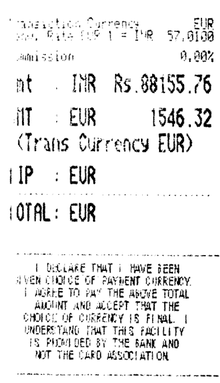- Dynamic currency conversion
-
For other uses, see DCC (disambiguation).
Dynamic Currency Conversion (DCC) or Cardholder Preferred Currency (CPC) is a financial service in which holders of credit cards have the cost of a transaction converted to their local currency when making a payment in a foreign currency. Currently this feature is only possible for Visa and MasterCard networks. American Express provides for multi currency transactions for ecommerce merchants.
Contents
DCC provides consumers with a rate of exchange at point of sale rather than waiting for a statement at the end of the billing cycle. The calculation of currency exchange is not computed by the issuer of the credit card but by the merchant who can set the rate of exchange. There has been controversy because some merchants have run dynamic currency conversion without giving the option to the cardholder or charge rates far in excess of what a bank might charge.[1]
Advantages and Disadvantages for Customers
In a typical transaction situation, cardholders are handed their receipt with an option to sign for the amount in the foreign currency or their home currency. Depending on the service provider, an explanation of the exchange rates are included (as shown on the scan displayed in this article) along with the prevailing rate of the day. The rates used, however, may or may not be based on the wholesale rate; this is dependent on the DCC provider. Some providers use Reuters Interbank for the exhange rate of transactions, and offer chargeback programs if a better rate can be shown to exist during the day of the purchase.[2] If the wholesale rate is used, the customer benefits from transparency and certainty.
To deter customers from requesting compensation for getting unfavorable conversion rates later, some providers employ a disclaimer comparable to the following (taken directly from included receipt scan), that is printed on the credit card slip:
"I DECLARE THAT I HAVE BEEN GIVEN CHOICE OF PAYMENT CURRENCY. I AGREE TO PAY THE ABOVE TOTAL AMOUNT AND ACCEPT THAT THE CHOICE OF CURRENCY IS FINAL. I UNDERSTAND THAT THIS FACILITY IS PROVIDED BY THE BANK AND NOT THE CARD ASSOCIATION"
An advantages to the Customer include:
- Being able to pay in his own currency when being unaware of the exchange rate
- The ability to enter expenses more easily (i.e. business travelers)
- Some issuing banks may not charge the foreign usage fee if the transaction is processed in the cardholder's home currency
Disadvantages to the Customer include:
- Consumers typically pay inflated exchange rates compared to the wholesale rate that would otherwise applied. [3]
- Many customers are critical of DCC as a method to top up profits from credit card transactions. On Ryanair flight purchases in particular, consumers spend up to 7% more per booking by using DCC.[4] It is important to note, however, that Ryanair also charges extra fees simply for booking with a credit card[5]
- Many issuing banks apply the foreign usage fee regardless of the currency that is processed, resulting in a very high fee for cardholders, though this practice is quickly becoming obsolete due to customer dissatisfaction
Advantages for Merchants
The biggest advantage for a merchant is receiving a small percentage of the currency conversion margin that is charged to each transaction. These financial returns make the process of DCC more appealing to merchants with high foreign volume.[6] The merchant earns extra revenue when the transaction is processed through DCC, and explanation to the customer about the nature of DCC is left to the individual merchants.
Controversy
Many consumers [7] are concerned that using DCC will result in higher credit card conversion fees than if they used their own card issuer's exchange rate.[8] In many cases, the price of the purchase can be much greater (5 to 7%) without any advantage to the customer other than seeing the amount paid in their currency directly on the credit card slip.
References
- ^ Collinson, Patrick (12 July 2008). "Going to Spain? Just say no". The Guardian (London). http://www.guardian.co.uk/money/2008/jul/12/foreigncurrency.consumeraffairs. Retrieved 1 May 2010.
- ^ [1] FEXCO Best Rate Guarantee
- ^ Gayle Keck and R. Paul Herman (31 Jul 2005). "Charge It . . . but Check the Math". The Washington Post (Washington, D.C.). http://www.washingtonpost.com/wp-dyn/content/article/2005/07/29/AR2005072900927.html. Retrieved 2 Jul 2011.
- ^ Brignall, Miles (15 Feb 2010). "Ryanair's Hidden Costs From Currency Conversion". The Guardian (London). http://www.guardian.co.uk/money/2010/feb/15/ryanair-costs-currency-conversion. Retrieved 8 Feb 2011.
- ^ Corrigan, Damian (N/A). "Ryanair's Multiple Credit Card Fees". About.com (Spain). http://gospain.about.com/od/ryanair/f/credit_card_fees.htm. Retrieved 9 March 2011.
- ^ [2] Benefits of FEXCOs DCC
- ^ [3] Travel Guide for your Finances - Buyer Beware: Dynamic Currency Conversion (DCC)
- ^ [4] Fodor's - They Just Don't Read or Listen about DCC Scam
External links
Categories:- Payment systems
- Electronic commerce
- Credit card terminology
Wikimedia Foundation. 2010.

